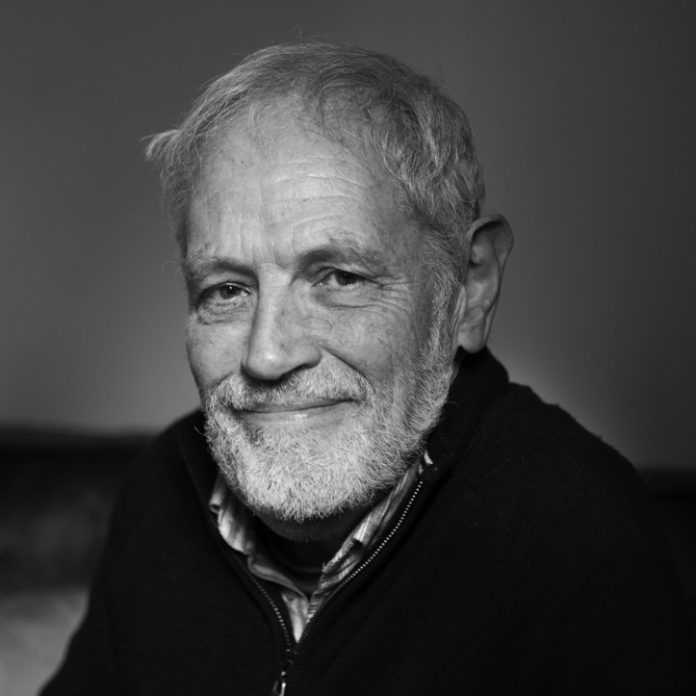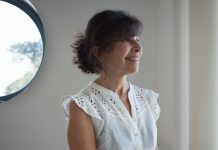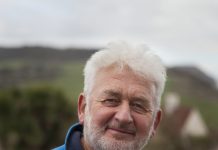‘I grew up in Sligo in the west of Ireland, the eldest of three children, two boys and a girl. I was one of a small percentage of Protestants in the town where my Dad was the Church of Ireland clergyman. Sligo is about the same size as Dorchester. We lived in a big eighteenth-century rectory, which had nearly three acres of garden. It was huge and surrounded by a ten-foot wall. As the only Protestant kid in that part of town and living behind these huge walls it was years before I got to know any of the local kids. I did meet other kids that went to our church, but in those days, and to a large extent now, schools were set up on religious lines, so I went to the very small Protestant junior school and then to Sligo Grammar.
The front gate of the house was like a little castle gate, and if I ventured outside of the house, local kids would shout ‘Proddy dog’ and throw stones at me—so I didn’t go out much. But then one day it was snowing and some boys came and threw snowballs and I threw some back and we got talking. My mother let me invite them in, and of course, as our garden was more of a jungle because it was unmaintained, we had a great time playing there. But then when I was 15, my parents decided that it might be better for my career to have O levels and A levels than the Irish Leaving Certificate, so I was sent off to boarding school in the North. Which as a boy of 15 I wasn’t too pleased about. They sent me off to Enniskillen in County Fermanagh, to a boys’ boarding school called Portora which included Samuel Beckett and Oscar Wilde among its past pupils.
I didn’t do as well as I had been doing in the Irish system but it was an education! I had never seen an Orange parade or encountered such hardline attitudes. Because I came from the South, the boys called me a Fenian. Anyway, despite not doing that well, it was enough to get into Trinity College Dublin where I did a degree in General Studies. One year I shared the room that Oscar Wilde had lived in when he was there. I had heard that Wilde had painted green butterflies on the walls of his room and of course after a few drinks one night I decided I wanted to have a look at them. It was a disappointment. Peeling back layers of wallpaper revealed nothing.
My main interest really was drama, so I spent the whole time at Trinity in the University theatre doing one play after another, which was something I had discovered I liked while at Portora. There were many of my fellow students who went on to great success. At one point I was in charge of putting the programme together for a show and when it was printed discovered that one of the main performers, fellow student Chris de Burgh’s name had been left out. Those were in the days, when he was playing small gigs in Captain America‘s burger bar in Grafton Street.
I did the postgraduate teacher training diploma in the late sixties early seventies—an eventful time. I was in Dublin when the British embassy was burnt down after Bloody Sunday. Then I got a placement in a school called Mountjoy which, during my time there, became Mount Temple. I came across a few characters. One of the 12 year-olds I taught English to was called Paul Hewson who now seems to be better known as Bono of U2. A friend and colleague was Dick Spring who later played rugby for Ireland and then went on to a career in at the top of Irish politics. We had some great craic over those years.
But of course, the curse of sectarian education meant that there were very few jobs in Irish Protestant schools at the time, not that I’d have had any objection to working in a Catholic school. It just wasn’t an option. So I decided to look for jobs in England. I got an interview in Nottingham and also in a place called Puddletown, which I’d never heard of. So I went into the British Rail office in Dublin and asked them where it was. They were as clueless as me but found it on the map. I was offered the job in Nottingham but having lived in a city for the past six years, I wanted to try life in the countryside. So I went to the interview in Puddletown, which at the time had the smallest secondary school in the England.
It was in the most fantastic setting, though the interview was eccentric, to say the least. The first question was “Mr Browne, can you swim?” to which I was tempted to answer “no I came by boat” but it turned out they had just built a swimming pool and needed someone to teach the children to swim. As it happened, I got the job to teach English and Drama but after one term I had enough of village life so I bought a small car and found somewhere to live in Dorchester.
Then in 1980 when they changed the school system, I moved to Dorchester Middle School. I stayed there as Head of English until 1985 when I was seconded to a post-graduate course in London for a year, learning how to promote reading and the use of libraries etc. It was this that led me to what I do now. One aspect of the course was to write a piece on local history, and I didn’t want to do the obvious things like the Romans or Thomas Hardy. So one day my next door neighbour told me he was going to Worth Matravers that night to stand on the cliffs. This was on a bitterly cold January night, and my first reaction was “Are you mad? It’s freezing out there!” Then he explained that it was the 200th anniversary of the shipwreck of the Halsewell East Indiaman and that he and a few friends planned to mark the occasion by going out onto the cliffs at midnight.
So I set about researching this shipwreck. It turned out that in 1786 this huge ship was wrecked off the Purbeck coast. Of course, there were many ships lost on the coast of Dorset, but this became a very big sensation at the time, in part because the local people of Worth Matravers managed to save lots of the crew. That was remarkable enough, but it was subsequently found that there were some young ladies on the ship who had all drowned along with the Captain. The story of why they were there was fascinating. The whole event caused a huge public outcry and also triggered an outpouring of artistic endeavour; there were poems, drawings, music and paintings by well-known artists. There was even a theatrical performance in honour of the event. Anyway, I did this for my course and when I got my assignment back it was the best mark I’d got all through the whole course and the tutor said why don‘t you work this up into a magazine article—which I never did. Instead, I decided to put it on hold as something to come back to when I retired one day.
I then went back to teaching. My wife Beth and I had had the first of our two sons Peter and Christopher at this stage, and soon after that, I got a job with the local authority. I became an Education advisor for the Education Department at Dorset County Hall. It was around the time when the national curriculum was coming in, and there was lots of training and retraining for teachers. It was a fantastic job because my role was very flexible. I was very keen on children’s literature and encouraging kids to read. So I used to run an annual event where I would invite leading authors to come down to Dorset for a day so teachers could meet them. Over 15 years there were many but I remember Allan Ahlberg, Michael Morpurgo and Shirley Hughes particularly. I also had responsibility for organising training for support staff. In those days there was no real career path for support staff, but over the years we put in place induction training, advanced training, NVQs and a path on to a degree course if they wanted. For many years, I was also a school Governor at St Osmund’s where my sons went to school, which was a great way of keeping in touch with school life. It’s all very well running courses, but unless you go to a school every now and then, you can get a bit isolated from reality!
So in 2010 when I retired, I wondered what I was going to do. I didn’t play golf, and I couldn’t just go to the pub every day, so I came back to the idea of writing about the Halsewell. I then spent a couple of years researching it and found out loads of stuff that nobody had known about before. It amazed me that nobody had ever written a book about it. I discovered that Captain Peirce’s logbooks were all available and I went off to India to research some of the places that he had been. That was terrific fun. It was eventually published in 2016, and since then I have been travelling around giving talks to various groups from small local history meetings to U3A and Probus. Last year I was a speaker at the Goa Literary Festival and before that at the Chalke Valley History Festival where I dressed up in full 18th century Sea Captain’s outfit. It’s a very dramatic story, so I get great feedback from these talks. This year I won the Dorchester Literary Festival writing prize of £1000 and have decided to invest that in the initial research for another historical biography and I’m also working on a novel. Retirement’s quite busy really.’










